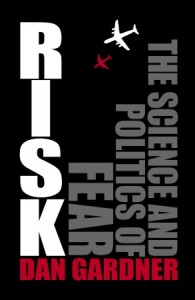Book Review: “Risk – The Science and Politics of fear”

I’ve just finished this book, and am writing the review because I’d recommend everyone to read it! In this book, Dan Gardner analyses the huge discrepancies between perceived dangers and real dangers, and the mechanics and feedback loops between individuals and the media that lead to our perception that the future is more dangerous than it has ever been.
The reality is that at no time before has the average (Western society) human being had a life expectancy and quality of life as they do today.
The arguments in the book are supported by hundreds of examples from research and as such is more of a long-winded executive summary than new ground breaking research, but it does combine all these points very eloquently for the person who wants to understand a bit more about the topic without reading mountains of dry research documentation. That said, it should be taken with a grain of salt – it is obvious that this is a very subjective analysis of the situation, and I’m sure there are other interpretations with their merits.
Ask for the book at your local book shop with the ISBN: 9780771032998, or get it at Amazon.
I can also recommend reading Bruce Schneier’s Blog (which is where I got the recommendation for the book).
You can follow any responses to this entry through the RSS 2.0 feed. Both comments and pings are currently closed.
April 9th, 2009 at 06:30
So is it all about terrorism-style danger or does it include things like disease ad global warming and so on? Don’t you think fearing for the worst has contributed to survival? I’m not trying to needle you – just provoke discussion!
April 9th, 2009 at 06:43
It compares the fears which are big in the media (terrorism, sexual predators, violent crime…), with those which things which we should be afraid of (the big killers are unhealthy diets, car accidents etc.) and in short shows anything which is in the news, is by definition nothing to be worried about (it’s there because it’s unusual).
Example: you are not likely to be shot, but if you are shot it’s 10 times more likely that the person is known to you, than some stranger in a dark alleyway.
Example: you believe that the previous statement is true in general, but you know no one around you would shoot you, so for you in the dark alleyway at the hands of a stranger is still the most likely place to be shot.
I agree that fear is a key element to survival, but when statements like “If one life is saved, it will have been worth it” just don’t cut it when spending the same amount of money on a much more imminent (but less dramatic, and so less newsworthy) risk would save thousands of lives.